AHI 155 The Islamic City
Section 001 (CRN: 20607)
Location: Shrem Museum of Art 1301
Time: M,W 10:00-11:20 AM
Instructor: Watenpaugh, Heghnar
Introduction to the urban history of the Islamic world. Critical study of the historiography of the Islamic city, development of urban form, institutions and rituals, and analysis of selected themes.
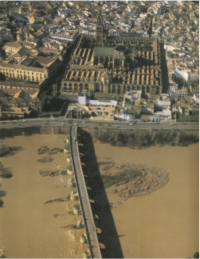
AHI 176A Art of the Middle Ages: Early Christian and Byzantine Art*
Section 001 (CRN: 20608)
Location: Shrem Museum of Art 1301
Time: M,W 11:40-1:00 PM
Instructor: Riordan, Lindsay
CLA 110 Origins of Rethoric
Section 001 (CRN: 49149)
Location: Lecture/ Discussion Wellman Hall 105
Time: MWF 1:10 - 2:00 PM
Instructor: Seal, Carey
COM 002 Major Works of the Medieval & Early Modern World
Section 001 (CRN: 26028)
Location: Lecture/ Discussion Wellman Hall 233
Time: M,W 2:10-4:00 PM
Instructor: Staff
COM 002 Major Works of the Medieval & Early Modern World
Section 002 (CRN: 26029)
Location: Lecture/ Discussion Wickson Hall 1038
Time: M,W 10:00-11:50 AM
Instructor: Staff
COM 116 Literatures of the Modern Middle East*
Section 001 (CRN: 49013)
Location: Lecture/ Discussion Social Science & Humanities 80
Time: TR 12:10 - 1:30 PM
Instructor: Radwan, Noah
ENL 010A Literatures in English I: To 1700
Premodern England: Strangers, Familiars, and (Other)worldly Journeys. Location: Olson Hall 146
Time: M,W,F 11:00-11:50 AM
Instructor: Werth, Tiffany Jo
- Section A01 (CRN: 30357); W 6:10-7:00 PM, Social Sciences 70
- Section A02 (CRN: 30358); W 7:10-8:00 PM, Social Sciences 71
- Section A03 (CRN: 30359); F 9:00-9:50, Olson Hall 151
- Section A04 (CRN: 30360); F 10:00-10:50, Olson Hall 117
The aim of this course is to introduce you to the strange, worldly- and other-worldly deep history of English literature to prepare you for advanced study. We will focus on literature written in English prior to 1700. Covering a wide range of texts—religious polemic, poetry, drama, travel narratives, and prose fiction—we will explore the “strangeness” of premodern England: a world that is simultaneously familiar and unsettling in its difference from our own twenty-first century Pacific West Coast perspective. Religious reform, explosive mercantile growth, other-world contact, catastrophic disease, the persistent threat of the Islamic Ottoman empire, as well as new technologies such as the printing press and the telescope, transformed how people understood the world around them, how they lived, loved, died, and how they wrote. We will be engaging in the skills of what neuroscientists call “deep reading,” a process that is slow, analytical, and meant to encourage the evocative process of “passing over.” This entails the act of taking on perspectives and feelings of others who are deeply different from ourselves—in time, space, and geography. In doing so, the course will foster encounters and perspectives that will allow us access to feelings, imagining, and thoughts of a world long passed but one that still reaches forward into our present culture. The course encourages that we converse with the dead to better know ourselves.
This course satisfies the following GEs: General Education: Arts & Humanities (AH); Writing Experience (WE)
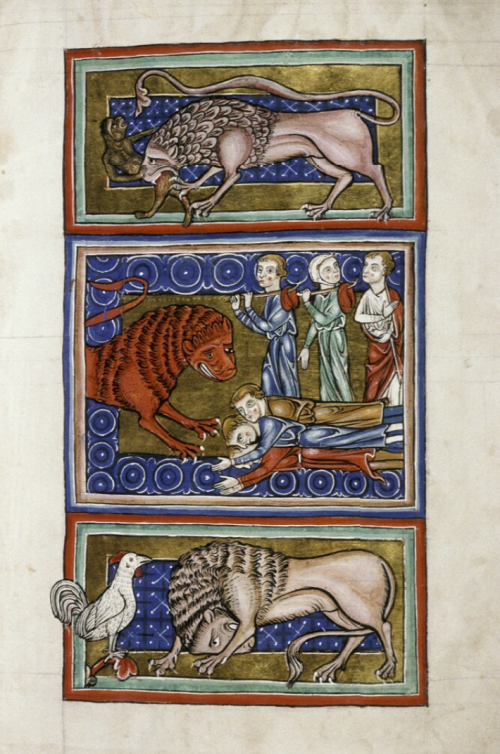
Bestiary. 13th Century. Oxford, Bodleian Library MS. Bodl. 764
ENL 113B Chaucer: The Canterbury Tales
Location: Olson Hall 146
Time: MWF 10:00 - 10:50 AM
Instructor: Waters, Claire
- Section A01 (CRN: 49270); W 4:10 - 5:00 PM, Olson Hall 244
- Section A02 (CRN: 49271); W 5:10 - 6:00 PM, Olson Hall 244
- Section A02 (CRN: 49272); R 9:00 - 9:50 AM, Social Science & Humanities 70
- Section A02 (CRN: 49272); R 10:00 - 10:50 AM, Olson Hall 151
Chaucer’s last major work is also his most famous, for its lively variety of voices and characters, its humor, its range of genres and literary styles. We will read a substantial selection of the Tales in their original Middle English, thinking about how the Canterbury Tales reflect on the literary traditions Chaucer inherited and the social world of late fourteenth-century England. We will also read modern critical takes on Chaucer and his works as well as a handful of responses to and reworkings of them by contemporary writers. Working with an unfamiliar (but manageable!) version of English is great linguistic strength training for creative and critical writers alike, and reading Chaucer makes it fun.
Required text: Geoffrey Chaucer, The Canterbury Tales: Seventeen Tales and the General Prologue, ed. V.A. Kolve and Glending Olson (New York: Norton, 2018).
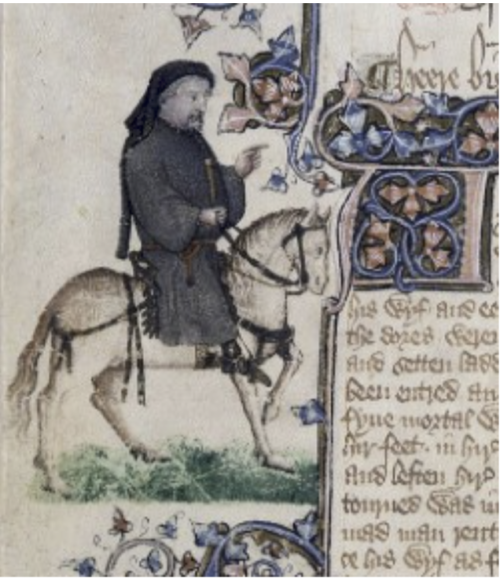
ENL 117 Shakespeare
Location: Olson Hall 146
Time: 9:00-10:20 AM
Instructor: Bloom, Gina
- Section A01 (CRN: 30493); R 6:10-7:00 PM, Olson Hall 151
- Section A02 (CRN: 30494); R 7:10-8:00 PM, Olson Hall 151
- Section A03 (CRN: 30495); F 9:00-9:50, Olson Hall 244
- Section A04 (CRN: 30496); F 10:00-10:50, Olson Hall 244
In this course we study plays from the early part of Shakespeare’s career and thus focus on histories and comedies. We will be especially interested in how these plays were composed to be performed in the Elizabethan theater, considering the plays in relation to four key areas of dramatic production: text, stage, actor, and audience. By attending to the theatrical conditions in which the plays were staged, we will be better positioned to explore the ways these dramas grapple with a range of historical and contemporary concerns, including: political power, social status, religious authority, gender difference, and individual agency.
This course fulfills the General Education World Cultures and Writing Experience requirements. It also fulfills the Upper Division Writing Requirement.
Plays we will read:
The Taming of the Shrew
As You Like It
Richard II
Henry IV, Part I
Richard III
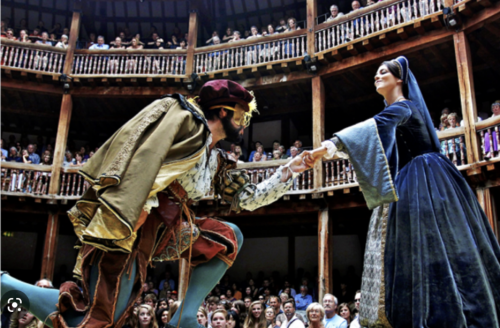
ENL 123 The Queer and Trans Eighteenth Century* Location: Lecture Bainer Hall 1130
Time: T,R 4:40-6:00 PM
Instructor: Nicolazzo, Sal
- Section A01 (CRN: 30497); R 6:10-7:00- Hunt 110
- Section A02 (CRN: 30498); R 7:10-8:00- Hunt 110
What does queer and trans literature look like centuries before Stonewall? How might historical vocabularies of gender and sexuality help expand contemporary possibilities for queer and trans life, politics, literature, or culture? This class explores these questions and more by delving into the surprisingly vast archive of queer and trans writing from the eighteenth-century Anglophone world (and beyond). The literary history of the queer and trans eighteenth century reveals a very long history of expansive possibilities for understanding, narrating, and imagining gender and sexuality. Topics will include: the marriage plot and its discontents; the relationships between trans visibility and the surveillance of gender; the centrality of both slavery and colonialism in shaping gender and sexuality in the period; and the uses of the past in contemporary queer/trans media, fandom, and politics.
ENL 126 Food, Culture, and Consumption in the Early British Empire*
Location: Lecture/Discussion Storer Hall 1342
Time: T, R 1:40-3:00 PM
Instructor: Nicolazzo, Sal
From our morning coffee or tea to our chocolate desserts, the food we consume every day is imported from all over the world, and bears centuries of global history.
This course examines the cultural meaning of food—from its production to its consumption—in the context of the early history of the British Empire. At the same time, we’ll consider how literary texts engage with the aesthetic properties of taste: how did writers develop new aesthetic strategies to describe sensory experiences—from the taste of a fresh pineapple to the buzz of caffeine—that circulated globally in unprecedented ways? How did recipe writing shape the writing of poetry and fiction? How can the history of food shed light on the histories of race and gender? How might we read the textual records of food for traces of the lives and experiences of people who grew and made the food, people who were displaced by colonial agriculture, or people who fought back against the violence at the root of this global food system?
ENL 171B: The Bible As Literature*
Location: Hart Hall 1116
Time: MWF 1:10-2:00 PM
Instructor: Waters, Claire
In this course, we will read selections from the Old Testament (that is, the Hebrew Bible, in translation) as centrally important cultural documents of western culture and works of literary artistry in various genres. While the Bible is a foundational religious document in many traditions, we will not be looking at it as theology or revelation; respect for others’ religious or non-religious orientation is important, but we will be focusing on the Bible’s literary aspects—genre, character, plot, setting, theme, poetic or prose form, repetition, allegory, metaphor, symbolism—and its cultural significance for believers and non-believers alike.
Required text: The Oxford Study Bible: Revised English Bible with the Apocrypha, ed. Suggs, Sakenfeld, and Mueller (1992)
FRE 107B: The Making of Modern France*
Location: Olson Hall 267
Time: TR 10:30-11:50 AM
Instructor: Goldstein, Claire
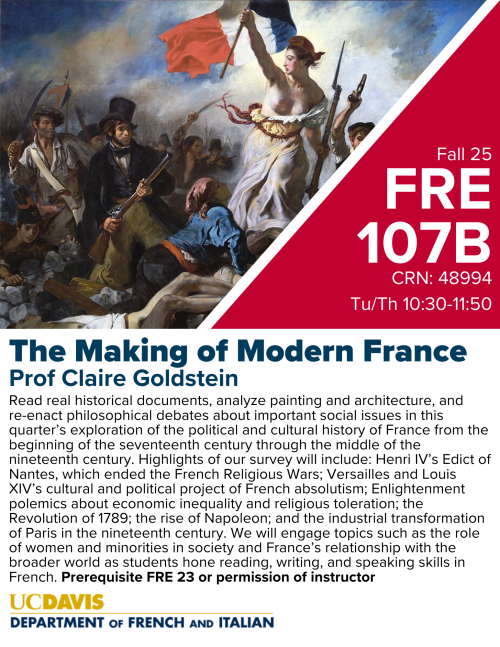
GER 121 The Medieval Period in German Literature
Section 001 (CRN: 49851)
Location: Wellman Hall 105
Time: T,R 1:40-3:00
Instructor: Arnett, Carlee
Far off places, daring sword fights, magic spells, a prince in disguise....forbidden love... Read fascinating literature from the German High Middle Ages and engage with the ideas of love, heroism, wealth, magic, fate, and the blend of Christianity and paganism. Meet the knights of the Round Table, the Green Knight and Kudrun, the captured princess by reading Der arme Heinrich, Iwain and the Green Knight and Kudrun as other epic tales.
HIS 002Y Introduction to the History of Science and Technology*
Location: Teaching and Learning Complex 1010
Time: M,W 1:10-2:00 PM
Instructor: Stolzenberg, Daniel
- Section A01 (CRN: 34384); M 9:00-10:00 AM, Cruess Hall 107
- Section A02 (CRN: 34385); W 10:00-10:50 AM, Storer Hall 1344
- Section A03 (CRN: 34386); W 11:00-11:50 AM, Bainer Hall 1132
- Section A04 (CRN: 34387); T 9:00-9:50- Hart Hall 1106
- Section A05 (CRN: 34388); T 10:00-10:50- Wellman Hall 103
- Section A06 (CRN: 34389); T 11:00-11:50- Hart Hall 1128
- Section A07 (CRN: 34390); T 12:10-1:00- Social Science & Humanities 70
HIS 007A History of Latin America to 1700*
Location: The Grove (Surge III) 1309
Time: T,R 1:40-3:00 PM
Instructor: Reséndez, Andrés
- Section A01 (CRN: 34402); W 9:00-9:50 AM, Wellman Hall 105
- Section A02 (CRN: 34403); W 10:00-10:50 AM, Wellman Hall 105
- Section A03 (CRN: 34404); R 11:00-11:50 AM, Olson Hall 251
- Section A04 (CRN: 34405); R 12:10-1:00 PM, Olson Hall 251
HIS 010B World History, C. 1350-1850*
Location: Wellman Hall 234
Time: MWF 2:10-3:00 PM
Instructor: Staff
- Section A01 (CRN: 34408); M 9:00-9:50 AM, Wellman Hall 105
- Section A02 (CRN: 34409); M 10:00-10:50 AM, Wellman Hall 105
- Section A03 (CRN: 34410); W 11:00-11:50 AM, Wellman Hall 234
- Section A04 (CRN: 34411); W 9:00-9:50 AM, Wellman Hall 234
JPN 101 Japanese Literature in Translation: The Early Period*
Section 001 (CRN: 35619)
Location: Lecture: Olson Hall 118. Discussion: Olson Hall 118
Time: Lecture: T,R 12:10-1:30 PM. Discussion: T,R 1:40-2:00 PM
Instructor: Gundry, David
LAT 100 Readings in Latin Prose
Section 001 (CRN: 35702)
Location: Lecture/Discussion Wellman Hall 107
Time: M,T,W,R 3:10-4:00
Instructor: Seal, Carey
LAT 103 Vergil: Aeneid (M)
Section 001 (CRN: 49433)
Location: Lecture/Discussion Wellman Hall 203
Time: T,R 1:40-3:00
Instructor: Popescu, Valentina
MSA 181B Sufism in South Asia*
Section 001 (CRN: 50354)
Location: Lecture/Discussion Brainer 1130
Time: M,W 4:40-6:00
Instructor: Brizendine, Ryan
MST 020A Intro to Late Antique & Early Medieval Worlds
Section 001 (CRN: 38742)
Location: Hart Hall 1128
Time: T,R 12:10-1:30 PM
Instructor: Arnett, Carlee
Between the 4th and the 12th centuries lies a period, which for Europe and the Middle East marks the beginning of contemporary life. This period brings intellectual ferment and open-mindedness of the Umayyads in Damascus and the Abbisids in Baghdad, the transcendence and political sophistication of the Eastern Roman Empire and Charlemagne in Western Europ. It was also an extraordinary time for the Song Dynasty in China, the Kingdom of Silla in Korea, the Nara Period in Japan, the Ghana Empire and the Ancestral Puebloans of North America. These society produce exceptional human achievements in philosophy, medicine, astronomy, navigation, poetry and many aspects of modern life.
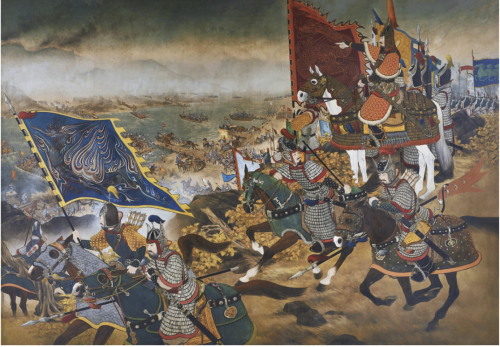
PHI 105 Philosophy of Religion
Location: Lecture Olson 158
Time: T,R 1:40-3:00
Instructor: Gilmore, Cody
- Section A01 (CRN: 43012); M 6:10-7:00- Olson 167
- Section A02 (CRN 43013); M 7:10-8:00- Olson 167
PHI 170 Spinoza & Leibniz (EM)
Section 001 (CRN: 42411)
Location: Lecture/Discussion Bainer Hall 1060
Time: MW 12:10 - 1:30 PM
Instructor: Naranjo Sandoval, Alejandro
POL 118A History of Political Theory: Ancient
Section 001 (CRN: 45052)
Location: Teaching and Learning Complex 3215
Time: Lecture MW 3:10 - 4:30 PM; Term Paper/Discussion TBA
Instructor: Satkunanandan, Shalini
RST 60 Christian Origins (M)
Section 001 (CRN: 49028) Location: Social Science & Humanities 80
Time: MWF 9:00 - 9:50 AM
Instructor: Terry, Wendy
RST 70 Religion & Language
Section 001 (CRN: 49023) Location: Social Science & Humanities 90
Time: TR 9:00 - 10:20 AM
Instructor: Brizendine, Ryan
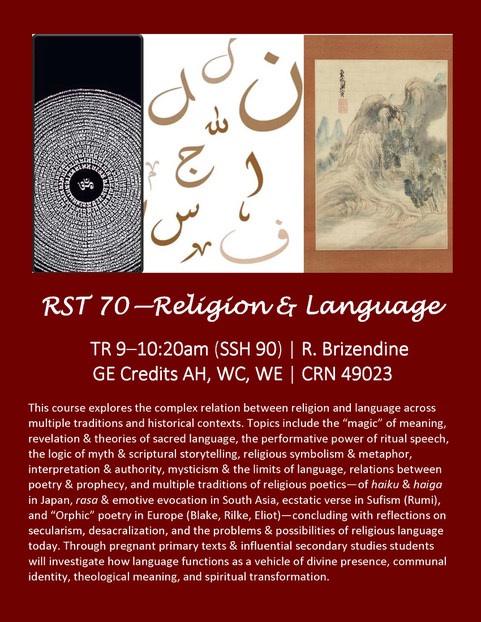
RST 115 Mysticism
Section 001 (CRN: 49029) Location: Social Science & Humanities 80
Time: MWF 11:00 - 11:50 AM
Instructor: Terry, Wendy
*This course can only be taken with permission from the MEMS Director. Please fill out the MEMS Request for Course Credit to be Counted for the Major or Minor.pdf